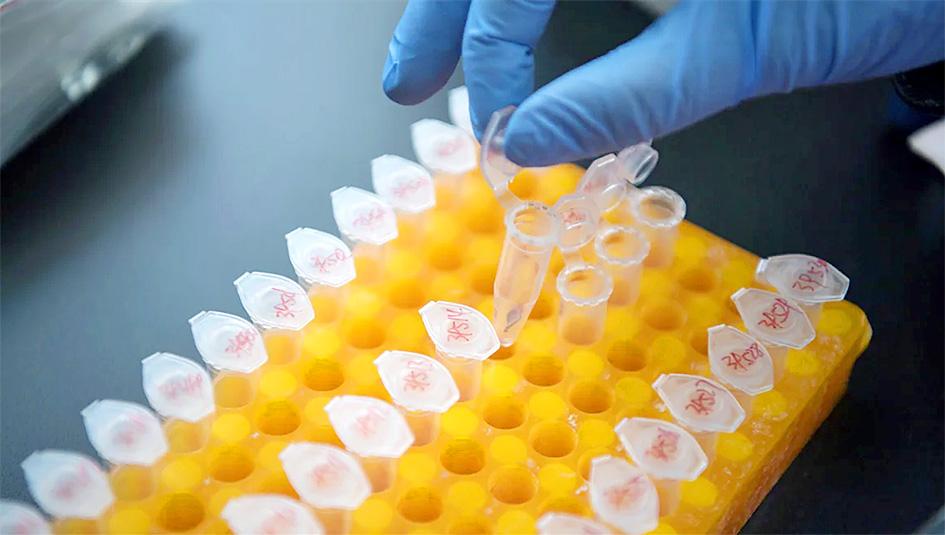Some of China’s senior doctors are raising concern over the quality of domestic generic medicines that have largely replaced Western brand-name drugs at hospitals, amid a rare public backlash against the government’s drive to cut medical costs.
Hospital chiefs and doctors in Beijing and Shanghai said the cheaper generic drugs mandated for use at public hospitals do not appear to have the same efficacy or side effects as drugs from major international pharmaceutical companies, local media Caixin and China Business News reported over the weekend.
They fear their widespread use risks breeding mistrust among doctors and patients.

Photo: AP
In a proposal to the ongoing annual local parliamentary session, doctors suggest greater flexibility in the nation’s drug-contract bidding process so that doctors and patients can have the choice to switch back to Western brand-name drugs when they want to, local media reported.
The complaints from frontline doctors have prompted the National Healthcare Security Administration, which oversees China’s state medical insurance scheme, to look into the issue.
The agency is to meet with doctors and experts in Shanghai this week to learn more about their advice and collect more clinical data on domestic generic medicines, a statement published on its Web site yesterday said.
Zheng Minhua, a senior surgeon at Shanghai’s prestigious Ruijin Hospital, cited in an interview with Caixin examples of how domestic generic medicines failed to work properly, such as not being able to control hypertension effectively or anesthetics not being able to put patients to sleep.
Since it was launched six years ago, the government’s drug bidding process, known as volume-based procurement, has seen off-patent medicines from global pharmaceutical giants such as AstraZeneca PLC and Pfizer Inc replaced by similar drugs made by domestic companies, often sold at a fraction of the price.
The program has saved Beijing billions of US dollars over the years, which it has then used to reimburse higher-value innovative therapies, including many blockbusters developed by Western drugmakers.
From 2018 to 2023, makers of generic drugs slashed prices by more than 50 percent on average to win contracts, with some cutting as much as 90 percent.
In the most recent round of procurement, the winning bids for generic aspirin tablets were as low as 0.03 yuan (US$0.0041) per pill, while folic acid tablets for pregnant women could be available for just 0.0289 yuan each.
While domestic generics supplied to Chinese hospitals have passed bioequivalence tests that show they work as well as the brand-name medicines, there has been growing chatter among patients and doctors since last year that the quality of these drugs does not quite measure up to the Western ones.
China is set to push for a new procurement round later this year. The rare backlash from doctors is raising questions whether Beijing’s bid to cut drug prices might have come at the expense of quality and might end up fomenting public discontent.

MONEY GRAB: People were rushing to collect bills scattered on the ground after the plane transporting money crashed, which an official said hindered rescue efforts A cargo plane carrying money on Friday crashed near Bolivia’s capital, damaging about a dozen vehicles on highway, scattering bills on the ground and leaving at least 15 people dead and others injured, an official said. Bolivian Minister of Defense Marcelo Salinas said the Hercules C-130 plane was transporting newly printed Bolivian currency when it “landed and veered off the runway” at an airport in El Alto, a city adjacent to La Paz, before ending up in a nearby field. Firefighters managed to put out the flames that engulfed the aircraft. Fire chief Pavel Tovar said at least 15 people died, but

LIKE FATHER, LIKE DAUGHTER: By showing Ju-ae’s ability to handle a weapon, the photos ‘suggest she is indeed receiving training as a successor,’ an academic said North Korea on Saturday released a rare image of leader Kim Jong-un’s teenage daughter firing a rifle at a shooting range, adding to speculation that she is being groomed as his successor. Kim’s daughter, Ju-ae, has long been seen as the next in line to rule the secretive, nuclear-armed state, and took part in a string of recent high-profile outings, including last week’s military parade marking the closing stages of North Korea’s key party congress. Pyongyang’s official Korean Central News Agency (KCNA) released a photo of Ju-ae shooting a rifle at an outdoor shooting range, peering through a rifle scope

South Korea would soon no longer be one of the few countries where Google Maps does not work properly, after its security-conscious government reversed a two-decade stance to approve the export of high-precision map data to overseas servers. The approval was made “on the condition that strict security requirements are met,” the South Korean Ministry of Land, Infrastructure and Transport said. Those conditions include blurring military and other sensitive security-related facilities, as well as restricting longitude and latitude coordinates for South Korean territory on products such as Google Maps and Google Earth, it said. The decision is expected to hurt Naver and Kakao

Australian Prime Minister Anthony Albanese yesterday said he did not take his security for granted, after he was evacuated from his residence for several hours following a bomb threat sent to a Chinese dance group. Albanese was evacuated from his Canberra residence late on Tuesday following the threat, and returned a few hours later after nothing suspicious was found. The bomb scare was among several e-mails threatening Albanese sent to a representative of Shen Yun, a classical Chinese dance troupe banned in China that is due to perform in Australia this month, a spokesperson for the group said in a statement. The e-mail